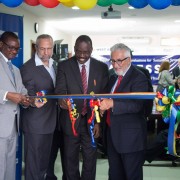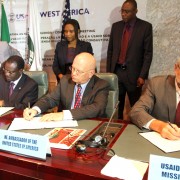This brief aims to draw the attention of leaders and policy-makers in West African coastal countries and regional institutions to the importance of mainstreaming climate change adaptation (responses to actual or expected climate and its effects to reduce harm or take advantage of opportunities) into coastal development planning. It highlights short- and long-term benefits of mainstreaming and provides recommendations for taking advantage of the National Adaptation Planning (NAP) process to mainstream adaptation effectively.

The U.S. Agency for International Development, in partnership with the U.S. Department of Agriculture’s Foreign Agricultural Service, the University of Rhode Island, Delaware State University, and the Kwame Nkrumah University of Science and Technology, today launched the Analytical Support Services and Evaluations for Sustainable Systems (ASSESS) Project. Through independent evaluations, analysis and the sharing of best practices, ASSESS will promote creativity, innovation and learning by USAID and its development partners, with the ultimate goal of increasing the effectiveness of their programs.

Today, the U.S. Agency for International Development (USAID) and the Economic Community for West African States (ECOWAS) expanded their partnership to promote peace and security, address energy challenges, and support trade activities in the region. With these amended agreements, USAID will provide an additional U.S. $ 23.6 million of support for activities promoting the following ECOWAS priorities:
Cotonou, Benin – Today, a Road Governance Caravan, co-organized by USAID and the Borderless Alliance, made the final stop of its journey along the main north-south commercial corridor in Benin. The aim of the Caravan was to identify transport costs and delays along the route so measures can be taken to reduce them, and ultimately to increase the flow of trade. Cotonou was the fourth of five stops the Caravan made in major towns along the corridor from June 23–30.
This study used the Modified Social Ecological Model as a framework to examine the social-, individual- and policy-level factors contributing to heightened risk of HIV among Key Populations and limited access to health services related to the continuum of HIV care among Key Populations. This study was part of a larger, multi-country study. Findings specific to Cameroon are presented in this research brief.







Comment
Make a general inquiry or suggest an improvement.